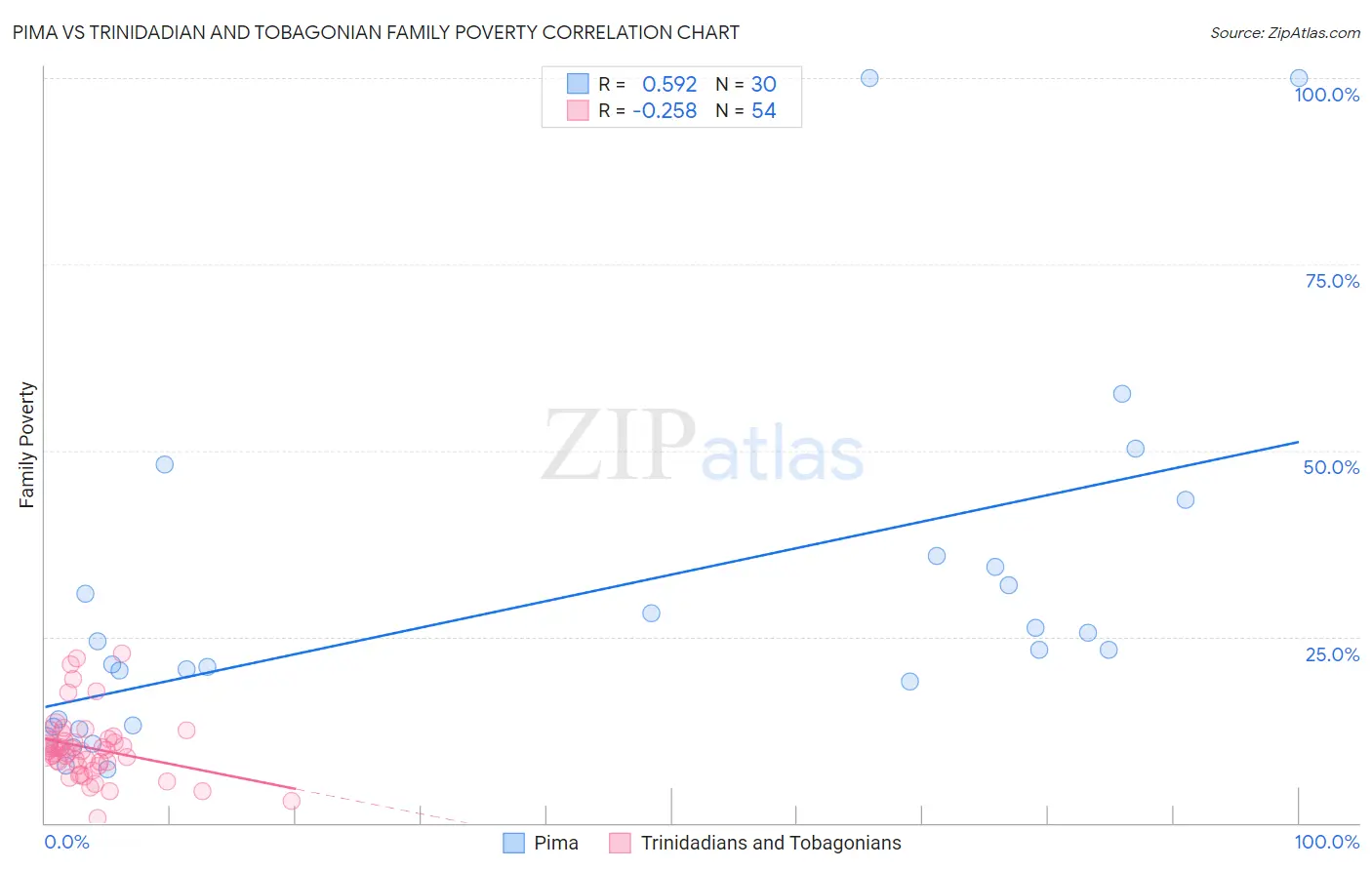Pima vs Trinidadian and Tobagonian Family Poverty
COMPARE
Pima
Trinidadian and Tobagonian
Family Poverty
Family Poverty Comparison
Pima
Trinidadians and Tobagonians
18.4%
FAMILY POVERTY
0.0/ 100
METRIC RATING
343rd/ 347
METRIC RANK
10.9%
FAMILY POVERTY
0.1/ 100
METRIC RATING
264th/ 347
METRIC RANK
Pima vs Trinidadian and Tobagonian Family Poverty Correlation Chart
The statistical analysis conducted on geographies consisting of 61,531,194 people shows a substantial positive correlation between the proportion of Pima and poverty level among families in the United States with a correlation coefficient (R) of 0.592 and weighted average of 18.4%. Similarly, the statistical analysis conducted on geographies consisting of 219,444,154 people shows a weak negative correlation between the proportion of Trinidadians and Tobagonians and poverty level among families in the United States with a correlation coefficient (R) of -0.258 and weighted average of 10.9%, a difference of 67.8%.

Family Poverty Correlation Summary
| Measurement | Pima | Trinidadian and Tobagonian |
| Minimum | 7.2% | 0.64% |
| Maximum | 100.0% | 22.8% |
| Range | 92.8% | 22.2% |
| Mean | 29.5% | 10.1% |
| Median | 23.3% | 9.9% |
| Interquartile 25% (IQ1) | 13.0% | 7.8% |
| Interquartile 75% (IQ3) | 34.4% | 11.2% |
| Interquartile Range (IQR) | 21.4% | 3.5% |
| Standard Deviation (Sample) | 23.1% | 4.5% |
| Standard Deviation (Population) | 22.7% | 4.4% |
Similar Demographics by Family Poverty
Demographics Similar to Pima by Family Poverty
In terms of family poverty, the demographic groups most similar to Pima are Yup'ik (18.7%, a difference of 1.8%), Navajo (18.8%, a difference of 2.4%), Immigrants from Yemen (17.5%, a difference of 5.1%), Lumbee (17.0%, a difference of 8.0%), and Pueblo (17.0%, a difference of 8.1%).
| Demographics | Rating | Rank | Family Poverty |
| Immigrants | Dominican Republic | 0.0 /100 | #333 | Tragic 14.4% |
| Houma | 0.0 /100 | #334 | Tragic 14.6% |
| Apache | 0.0 /100 | #335 | Tragic 14.7% |
| Sioux | 0.0 /100 | #336 | Tragic 15.9% |
| Hopi | 0.0 /100 | #337 | Tragic 15.9% |
| Crow | 0.0 /100 | #338 | Tragic 16.1% |
| Yuman | 0.0 /100 | #339 | Tragic 16.6% |
| Pueblo | 0.0 /100 | #340 | Tragic 17.0% |
| Lumbee | 0.0 /100 | #341 | Tragic 17.0% |
| Immigrants | Yemen | 0.0 /100 | #342 | Tragic 17.5% |
| Pima | 0.0 /100 | #343 | Tragic 18.4% |
| Yup'ik | 0.0 /100 | #344 | Tragic 18.7% |
| Navajo | 0.0 /100 | #345 | Tragic 18.8% |
| Puerto Ricans | 0.0 /100 | #346 | Tragic 20.3% |
| Tohono O'odham | 0.0 /100 | #347 | Tragic 20.4% |
Demographics Similar to Trinidadians and Tobagonians by Family Poverty
In terms of family poverty, the demographic groups most similar to Trinidadians and Tobagonians are Cape Verdean (10.9%, a difference of 0.020%), Immigrants from Trinidad and Tobago (10.9%, a difference of 0.060%), Spanish American Indian (10.9%, a difference of 0.28%), Shoshone (10.9%, a difference of 0.41%), and Bangladeshi (10.9%, a difference of 0.44%).
| Demographics | Rating | Rank | Family Poverty |
| Immigrants | Ghana | 0.2 /100 | #257 | Tragic 10.8% |
| Sub-Saharan Africans | 0.2 /100 | #258 | Tragic 10.9% |
| Mexican American Indians | 0.2 /100 | #259 | Tragic 10.9% |
| Bangladeshis | 0.2 /100 | #260 | Tragic 10.9% |
| Shoshone | 0.2 /100 | #261 | Tragic 10.9% |
| Spanish American Indians | 0.2 /100 | #262 | Tragic 10.9% |
| Cape Verdeans | 0.1 /100 | #263 | Tragic 10.9% |
| Trinidadians and Tobagonians | 0.1 /100 | #264 | Tragic 10.9% |
| Immigrants | Trinidad and Tobago | 0.1 /100 | #265 | Tragic 10.9% |
| Immigrants | El Salvador | 0.1 /100 | #266 | Tragic 11.0% |
| Comanche | 0.1 /100 | #267 | Tragic 11.0% |
| Jamaicans | 0.1 /100 | #268 | Tragic 11.1% |
| Immigrants | Ecuador | 0.1 /100 | #269 | Tragic 11.1% |
| Immigrants | Nicaragua | 0.1 /100 | #270 | Tragic 11.1% |
| Immigrants | Bahamas | 0.1 /100 | #271 | Tragic 11.1% |